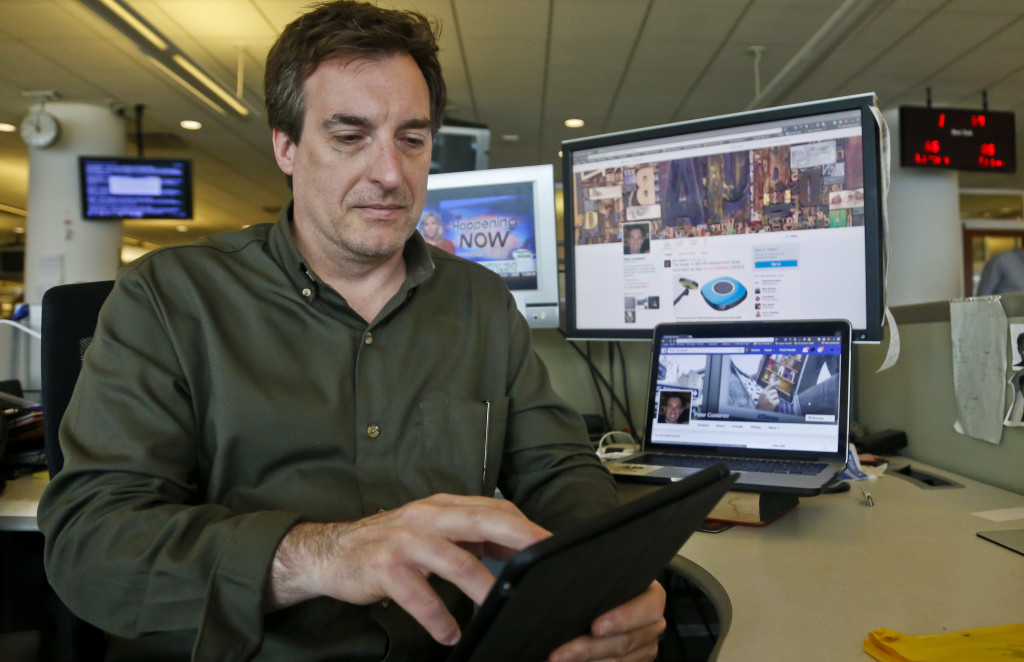
In this May 13, photo, Peter Costanzo is shown at the Associated Press headquarters where he is the digital and archival manager in New York. AP
WASHINGTON—Peter Costanzo is the man who helped turn Donald Trump into @RealDonaldTrump.
That, of course, is Trump’s Twitter account—a high-octane portal for the presumptive Republican presidential nominee to pump out insults, political attacks and self-promotion to more than 8 million followers. But the billionaire’s foray into the world of social media began with a much simpler purpose, yet one that’s still distinctively Trump: making money.
Costanzo crossed paths with Trump in 2009 when he was working as online marketing director for the publishing company putting out the businessman’s book, “Think Like a Champion.” Twitter was still in its infancy at the time. But Costanzo saw the 140-character-per-message platform as a new tool that the real estate mogul could use to boost sales and reach a broader audience.
He was given seven minutes to make his pitch to Trump—”Not five minutes, not 10,” Constanzo said—in a boardroom at Trump Tower in Manhattan that appeared to be the same one used on Trump’s reality television show.
Trump liked what he heard.
“I said, ‘Let’s call you @RealDonaldTrump—you’re the real Donald Trump,'” Costanzo said. “He thought about it for a minute and said, ‘I like it. Let’s do it.'”
Costanzo would spend the next several months helping coordinate Trump’s Twitter account, as well as his official Facebook page, often sending out messages for his famous client. He credited Trump with being an early adopter of the service and says he believes Trump understood its potential.
“He seemed very excited about the idea of being able to reach people so directly,” Costanzo said. “I think he immediately got it.”
Trump’s office confirmed the outlines of Costanzo’s account. Costanzo—a 51-year-old who goes by @PeterCostanzo on Twitter—now works as digital and archival publishing manager for The Associated Press, a position that is separate from the news department.
While Costanzo’s moniker for Trump on Twitter may have survived, the early days of the businessman’s account bear little resemblance to the current iteration, which frequently drives news in the White House race.
During the roughly eight months when Costanzo was in charge of the burgeoning Trump Twitter account, each missive was carefully crafted by the publishing company or the businessman’s office. Trump got final approval before Costanzo pressed “Tweet.”
Most of the messages were quotations from the book, a collection of Trump lessons on life and business. “My persona will never be that of a wallflower—I’d rather build walls than cling to them,” read one early tweet.
Sometimes Trump would send word through an associate that he wanted to offer a holiday greeting. His retweets were rare then.
Now, Trump starts firing off messages early in the morning and often continues past midnight. He’ll shout out tweets for aides to type during the day and take over himself at night. Spelling and grammar are sometimes amiss, and exclamation points are plentiful.
Trump frequently retweets messages from other people’s accounts, something he’s admitted “gets me in trouble.” He faced particular criticism for retweeting an unflattering photo of former rival Ted Cruz’s wife and has since said he wished he hadn’t done that.
Costanzo, who no longer has any role with Trump’s Twitter account or books, says he’s marveled at the following his most famous client has built on social media. Asked whether he had any Twitter advice for Trump now, Costanzo said, “He seems to be doing just fine without me.”